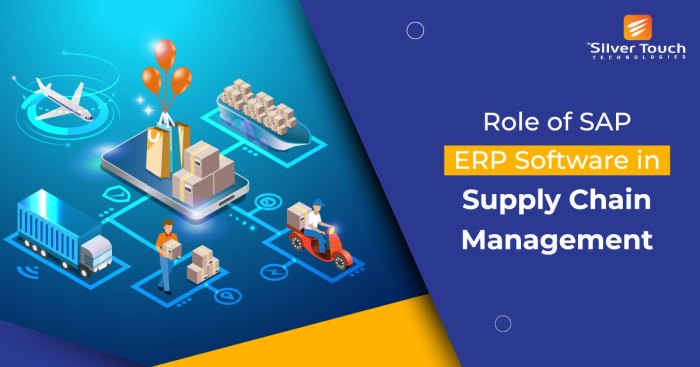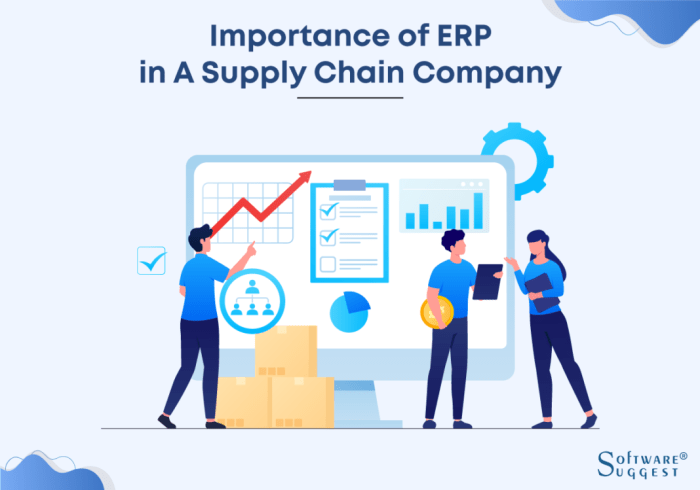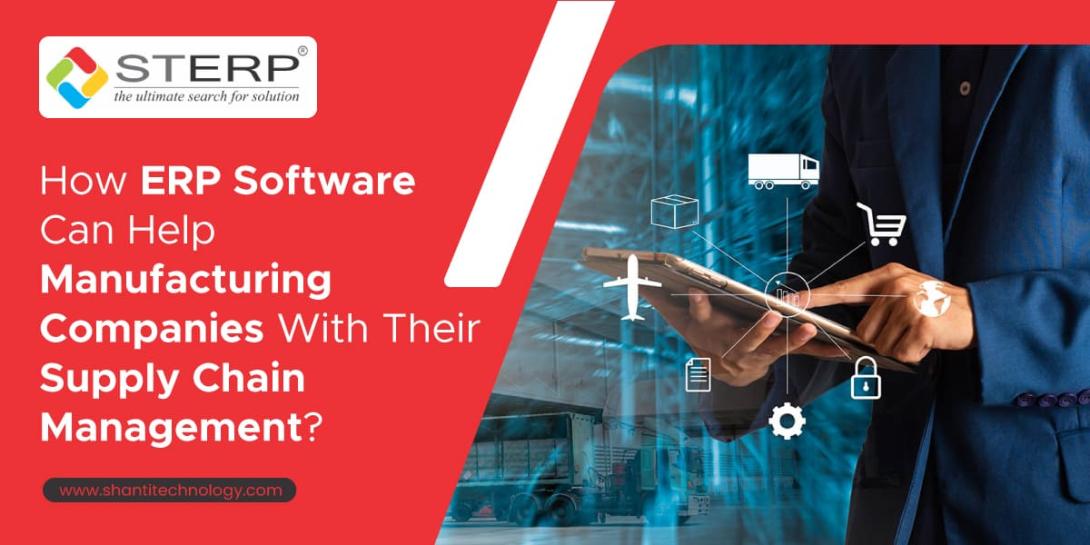How ERP software can help streamline supply chain management is a question that’s increasingly on the minds of business leaders. In today’s fast-paced, globalized marketplace, efficiency and agility are paramount, and a well-oiled supply chain is the backbone of any successful enterprise. Enterprises are constantly looking for ways to improve their supply chain operations, and ERP software has emerged as a powerful tool to help achieve this goal.
ERP, or Enterprise Resource Planning, is a suite of software applications that helps businesses manage and integrate their core business processes, including finance, human resources, and, importantly, supply chain management. By bringing together data from across the organization, ERP software provides a unified view of the entire supply chain, allowing businesses to identify bottlenecks, optimize workflows, and make data-driven decisions.
Introduction

In today’s dynamic business environment, characterized by globalization, volatile market conditions, and ever-evolving customer demands, maintaining an efficient supply chain is no longer a mere advantage; it’s a necessity for survival and growth. Companies need to optimize every aspect of their supply chain, from sourcing raw materials to delivering finished products, to ensure timely delivery, minimize costs, and maintain customer satisfaction.
This is where Enterprise Resource Planning (ERP) software comes into play. ERP software acts as a central hub for managing various business processes, including finance, human resources, and, importantly, supply chain management. By integrating data from different departments and systems, ERP software provides a comprehensive view of the entire supply chain, enabling businesses to identify bottlenecks, optimize resource allocation, and make data-driven decisions.
The Role of ERP Software in Streamlining Supply Chain Management
ERP software plays a pivotal role in streamlining supply chain management by offering a suite of tools and functionalities that address various challenges, such as:
- Improved Visibility and Transparency: ERP software provides real-time visibility into inventory levels, order status, and supplier performance. This enables businesses to track materials throughout the supply chain, identify potential delays, and proactively address issues.
- Enhanced Inventory Management: By centralizing inventory data, ERP software helps companies optimize inventory levels, reduce storage costs, and minimize stockouts. This is achieved through features like demand forecasting, automated purchase orders, and warehouse management tools.
- Streamlined Procurement Processes: ERP software automates procurement processes, streamlining the sourcing, negotiation, and purchasing of goods and services. This reduces manual effort, improves efficiency, and ensures timely procurement.
- Optimized Production Planning: ERP software facilitates efficient production planning by integrating data from various departments, such as sales, inventory, and manufacturing. This allows companies to optimize production schedules, allocate resources effectively, and meet customer demand.
- Improved Supply Chain Collaboration: ERP software enables seamless collaboration between internal departments and external partners, such as suppliers and distributors. This facilitates information sharing, improves communication, and fosters a more cohesive supply chain.
Key Benefits of ERP for Supply Chain Management

ERP software offers a comprehensive solution for managing and optimizing various aspects of the supply chain, enabling businesses to streamline processes, enhance visibility, and improve overall efficiency. By integrating different functions and departments within a single system, ERP empowers organizations to gain real-time insights, make data-driven decisions, and achieve greater agility in a dynamic market environment.
Inventory Management
Effective inventory management is crucial for optimizing supply chain operations. ERP systems play a vital role in achieving this by providing real-time visibility into inventory levels, facilitating accurate forecasting, and enabling efficient stock management.
- Real-time Visibility: ERP systems provide a centralized platform for tracking inventory levels across different locations, warehouses, and distribution centers. This real-time visibility eliminates the need for manual data entry and reduces the risk of stockouts or overstocking.
- Accurate Forecasting: ERP software uses historical data and advanced analytics to generate accurate demand forecasts. This information helps businesses anticipate future demand patterns, optimize production schedules, and ensure timely procurement of raw materials.
- Efficient Stock Management: ERP systems automate inventory management processes, such as order fulfillment, stock replenishment, and warehouse management. They also provide tools for managing inventory levels, setting reorder points, and tracking expiration dates, ensuring optimal inventory utilization.
Procurement Processes
Streamlining procurement processes is essential for reducing costs, improving efficiency, and ensuring timely delivery of goods. ERP software provides a centralized platform for managing supplier relationships, contract management, and order placement.
- Supplier Selection: ERP systems facilitate the selection of suitable suppliers based on factors such as price, quality, delivery time, and past performance. They also provide tools for evaluating supplier performance and managing supplier relationships.
- Contract Management: ERP software streamlines contract management by providing a central repository for storing and managing all contracts. It also automates contract renewal processes, ensures compliance with legal requirements, and helps track contract performance.
- Order Placement: ERP systems simplify order placement by automating the process of generating purchase orders, sending them to suppliers, and tracking order status. They also facilitate online communication with suppliers and provide tools for managing order fulfillment.
Logistics and Transportation
Optimizing logistics and transportation is crucial for ensuring timely delivery of goods and minimizing transportation costs. ERP software plays a significant role in this area by providing tools for route planning, shipment tracking, and delivery management.
- Route Planning: ERP systems use advanced algorithms to optimize delivery routes, taking into account factors such as distance, traffic conditions, and delivery time windows. This helps minimize transportation costs and ensures efficient delivery of goods.
- Shipment Tracking: ERP software provides real-time visibility into shipment status, allowing businesses to track shipments from origin to destination. This enables timely updates to customers, reduces delays, and improves overall logistics efficiency.
- Delivery Management: ERP systems streamline delivery management by providing tools for scheduling deliveries, assigning delivery personnel, and managing delivery exceptions. They also facilitate communication with customers and provide tools for managing delivery confirmations.
Specific ERP Features for Supply Chain Streamlining

ERP systems offer a range of modules specifically designed to streamline and optimize supply chain operations. These modules provide a centralized platform for managing various aspects of the supply chain, enabling businesses to enhance efficiency, reduce costs, and improve overall performance.
Inventory Management
Effective inventory management is crucial for supply chain efficiency. ERP systems provide comprehensive inventory management modules that enable businesses to track inventory levels, monitor stock movements, and manage warehouse operations. These modules help businesses:
- Real-time Inventory Visibility: ERP systems offer real-time visibility into inventory levels across all locations, allowing businesses to accurately track stock availability and prevent stockouts.
- Automated Inventory Replenishment: ERP systems can automate inventory replenishment processes, ensuring that stock levels are maintained at optimal levels. This eliminates manual calculations and reduces the risk of overstocking or stockouts.
- Inventory Optimization: ERP systems use advanced algorithms to optimize inventory levels based on demand forecasting, lead times, and other factors. This helps businesses minimize holding costs and improve inventory turnover.
- Warehouse Management: ERP systems provide modules for managing warehouse operations, including receiving, storing, picking, and shipping. These modules enhance efficiency and accuracy in warehouse processes.
Procurement
Efficient procurement is essential for ensuring the timely availability of materials and supplies. ERP systems offer procurement modules that streamline the procurement process, from identifying suppliers to placing orders and managing payments. These modules help businesses:
- Supplier Management: ERP systems allow businesses to manage supplier information, track performance, and negotiate contracts. This enables businesses to identify and select reliable suppliers.
- Automated Purchasing: ERP systems automate the purchase order process, reducing manual errors and improving efficiency. Businesses can create and manage purchase orders electronically, eliminating the need for paper-based processes.
- Centralized Procurement: ERP systems provide a centralized platform for managing all procurement activities, ensuring consistency and transparency across the organization.
- Supplier Collaboration: ERP systems can facilitate communication and collaboration with suppliers, enabling businesses to share information, track orders, and resolve issues quickly.
Production Planning
Production planning is a critical aspect of supply chain management, ensuring that goods are produced in the right quantities and at the right time. ERP systems provide production planning modules that help businesses plan and manage production processes effectively. These modules enable businesses to:
- Demand Forecasting: ERP systems use historical data and statistical models to forecast demand for products, allowing businesses to plan production accordingly.
- Production Scheduling: ERP systems optimize production schedules based on demand forecasts, available resources, and production constraints. This ensures that production runs smoothly and efficiently.
- Material Requirements Planning (MRP): ERP systems use MRP to calculate the required quantities of materials and components for production, ensuring that all necessary materials are available when needed.
- Capacity Planning: ERP systems help businesses plan and manage production capacity, ensuring that they have the necessary resources to meet demand.
Analytics and Reporting
ERP systems provide powerful analytics and reporting tools that enable businesses to monitor supply chain performance and identify areas for improvement. These tools provide valuable insights into:
- Inventory Turnover: Analytics tools can track inventory turnover rates, identifying slow-moving inventory and opportunities for optimization.
- Lead Times: ERP systems can track lead times for suppliers and production processes, identifying bottlenecks and areas for improvement.
- Customer Service: Analytics can track order fulfillment rates and delivery times, providing insights into customer service performance.
- Cost Analysis: ERP systems can analyze supply chain costs, including inventory holding costs, transportation costs, and production costs, identifying opportunities for cost reduction.
Supply Chain Collaboration
ERP systems facilitate communication and data sharing among internal and external stakeholders, fostering collaboration and improving supply chain performance. Key features include:
- Centralized Data Repository: ERP systems provide a centralized repository for all supply chain data, ensuring that all stakeholders have access to the same information.
- Real-time Communication: ERP systems enable real-time communication between internal departments and external stakeholders, facilitating efficient collaboration and issue resolution.
- Automated Notifications: ERP systems can send automated notifications to stakeholders about order updates, shipment status, and other important events, keeping everyone informed.
- Collaboration Portals: Some ERP systems offer collaboration portals that provide a secure platform for sharing information, documents, and communication with suppliers, customers, and other stakeholders.
Case Studies and Examples
Real-world examples of businesses leveraging ERP to streamline their supply chains can provide valuable insights into the tangible benefits of this technology. These case studies illustrate how ERP implementation can lead to significant improvements in key supply chain performance metrics, ultimately driving cost savings, enhanced efficiency, and increased profitability.
Improved Inventory Management and Reduced Lead Times
Implementing an ERP system can dramatically improve inventory management by providing real-time visibility into stock levels, demand patterns, and supplier performance. This visibility allows businesses to optimize inventory levels, reducing both excess inventory carrying costs and stockouts.
For instance, a leading automotive manufacturer implemented an ERP system to gain a comprehensive view of their global supply chain. This enabled them to accurately forecast demand, optimize inventory levels, and reduce lead times by 20%.
Enhanced Supply Chain Collaboration and Visibility
ERP systems facilitate seamless communication and collaboration between different departments and external partners, such as suppliers and distributors. This enhanced visibility allows businesses to track orders, shipments, and deliveries in real-time, improving overall supply chain transparency.
A multinational consumer goods company implemented an ERP system to improve collaboration with their suppliers. This allowed them to share real-time data on demand forecasts, inventory levels, and production schedules, leading to a 15% reduction in lead times and improved supplier performance.
Increased Customer Satisfaction and Reduced Costs
By streamlining supply chain operations, ERP systems can lead to faster delivery times, improved order accuracy, and enhanced customer service. This translates into increased customer satisfaction and loyalty.
A major retailer implemented an ERP system to optimize their order fulfillment process. The system enabled them to track orders from placement to delivery, reducing delivery times by 10% and improving order accuracy by 5%. This resulted in a significant increase in customer satisfaction and a decrease in customer complaints.
Challenges and Considerations
Implementing and utilizing ERP software for supply chain management can be a complex undertaking. While the benefits are significant, organizations must be aware of potential challenges and carefully consider their approach to ensure a successful implementation.
The success of any ERP implementation hinges on careful planning, thorough evaluation, and a well-defined strategy. It is crucial to address these challenges head-on to maximize the potential of ERP software in optimizing supply chain management.
Choosing the Right ERP Solution
Selecting the appropriate ERP solution is critical for realizing the full benefits of ERP for supply chain management. The right ERP system should be aligned with the specific needs and requirements of the business, considering factors such as industry, size, and complexity of operations.
- Industry-Specific Requirements: ERP solutions tailored to specific industries, such as manufacturing, retail, or healthcare, offer specialized functionalities and pre-configured processes that can streamline supply chain operations.
- Business Size and Complexity: The scale and complexity of a business will influence the choice of ERP system. Smaller businesses may benefit from cloud-based ERP solutions with flexible scalability, while larger enterprises may require on-premise solutions with greater customization capabilities.
- Integration with Existing Systems: The ERP system must seamlessly integrate with existing supply chain systems, such as warehouse management systems (WMS), transportation management systems (TMS), and customer relationship management (CRM) systems. This ensures data consistency and avoids information silos.
Implementation and Integration Challenges, How ERP software can help streamline supply chain management
Implementing and integrating ERP software with existing supply chain systems can present a number of challenges. These challenges require careful planning, resource allocation, and effective communication to ensure a smooth transition.
- Data Migration and Cleansing: Migrating data from legacy systems to the new ERP system can be a complex and time-consuming process. Data cleansing is essential to ensure data accuracy and consistency, which is crucial for accurate reporting and decision-making.
- Process Re-engineering: Implementing an ERP system may require re-engineering existing business processes to align with the functionalities of the new system. This can involve significant changes to workflows, responsibilities, and communication channels.
- User Training and Adoption: Successful ERP implementation requires effective user training and adoption. Users need to be trained on the new system’s functionalities and how to use it efficiently to maximize its benefits. Resistance to change can be a significant challenge, so clear communication, incentives, and ongoing support are essential.
- System Customization and Configuration: Customizing and configuring the ERP system to meet specific business needs can be a complex and time-consuming task. This requires expertise in the ERP software and a deep understanding of the organization’s supply chain processes.
- Cost and Time Investment: Implementing an ERP system requires a significant investment of time, resources, and money. It is essential to have a realistic budget and timeline, and to carefully consider the return on investment (ROI) before embarking on an ERP implementation project.
Best Practices for Successful ERP Implementation
To mitigate challenges and ensure a successful ERP implementation, organizations should follow best practices that emphasize careful planning, effective communication, and continuous improvement.
- Define Clear Goals and Objectives: Clearly define the goals and objectives of the ERP implementation project, including specific metrics for measuring success. This will help ensure that the implementation is aligned with the organization’s overall business strategy.
- Engage Stakeholders: Involve key stakeholders from across the organization in the planning and implementation process. This will ensure that the ERP system meets the needs of all departments and functions within the supply chain.
- Phased Implementation: Implement the ERP system in phases to minimize disruption and ensure a smooth transition. Start with a pilot project in a specific department or area, then gradually roll out the system to other parts of the organization.
- Continuous Improvement: ERP implementation is an ongoing process. Continuously evaluate the system’s performance and identify areas for improvement. This may involve making adjustments to processes, configurations, or user training.
The implementation of ERP software for supply chain management is a strategic investment that can deliver significant benefits to businesses. By streamlining operations, improving visibility, and fostering collaboration, ERP empowers organizations to meet the challenges of today’s complex and dynamic business environment. With its ability to optimize inventory management, procurement, logistics, and overall supply chain performance, ERP software has become an essential tool for businesses seeking to achieve sustainable growth and competitive advantage in the global marketplace.
Essential Questionnaire: How ERP Software Can Help Streamline Supply Chain Management
What are some of the key challenges in implementing ERP for supply chain management?
Implementing ERP software can be complex and time-consuming, requiring significant investment in resources, training, and data migration. It’s essential to choose the right ERP solution for specific business needs and to have a well-defined implementation plan. Additionally, integrating ERP with existing systems and ensuring data accuracy can be challenging.
How can I choose the right ERP solution for my business?
Choosing the right ERP solution involves carefully evaluating your business needs, industry requirements, and budget. Consider factors like the size of your organization, the complexity of your supply chain, and the specific features and functionality you require. It’s also helpful to consult with industry experts and explore different ERP vendors to find the best fit for your organization.